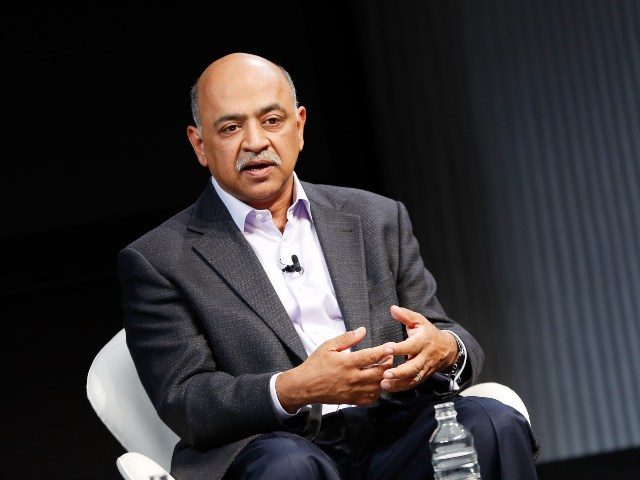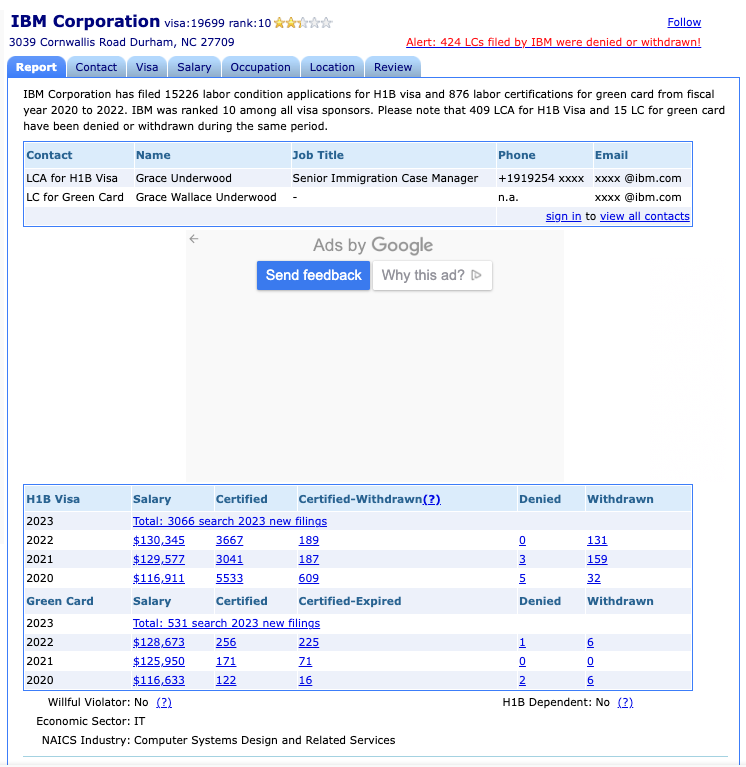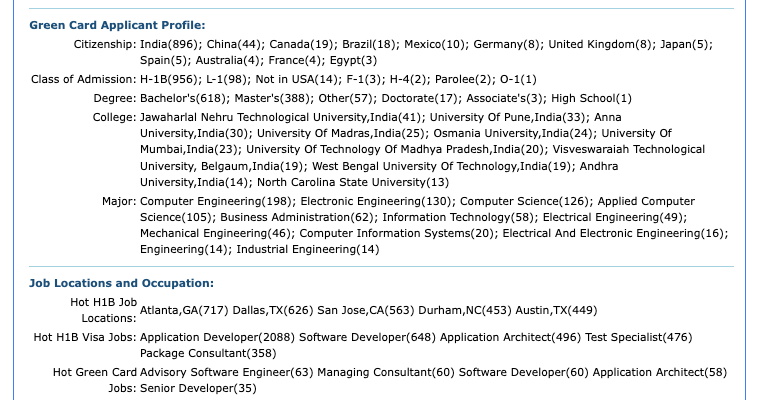IBM’s Indian-born CEO is insisting the company does not discriminate against American job-seekers by race, following the leak of a 2021 video showing him apparently offering bonuses to executives who meet racial quotas.
“It’s a 5 percent change” in bonuses to ensure hiring “inclusion,” pleaded IBM CEO Arvind Krishna in a video released Wednesday by the O’Keefe Media Group:
That means 95 percent of exec[utive] bonuses are driven by business performance. What drives business performance? Having the best people in the role!
The scandal blew up when James O’Keefe posted the 2021 video of Krishna apparently telling his executives that their bonuses would be raised if they hired Americans in proportion to their race’s and sex’s representation in the U.S. population.
“We want to get to the representational demographics of the underlying population,” Krishna said, adding:
I’m not trying to finesse this. For blacks, we should get to around 13 point something percent. On Hispanics, you’ve got to get into the mid-teens. On [sex] gender, we are somewhere in the mid-30s, I think for all of IBM. But I think if I notice right, the [overall female] representational is 50 [percent].
Meeting the goals “leads to a plus on your bonus, he said, adding, “By the way, if you [fail to meet the quotas], you lose part of your bonus.”
Many American professionals working in Fortune 500 companies report they are hurt by widespread and routine discrimination. The discrimination chokes job and promotion opportunities for ordinary Americans but it is often portrayed as laudable goals for “Diversity, Equity, and Inclusion,” or DEI.
DEI offers a bureaucratic, political, and legal shield for Wall Street investors and top executives who prefer to sideline Americans in favor of hiring a huge workforce of low-wage Indian-born visa workers and Indian-born managers.
Despite Krishna’s statements, IBM faces little legal risk from President Joe Biden’s federal government. In the last two years, his deputies have given minor wrist-slap penalties to Facebook and Apple for organized and consistent discrimination against American professionals.
However, IBM does face risks of private lawsuits.
On Wednesday, Stephen Miller’s law firm announced it would sue IBM for discrimination.
“On December 11, 2023, a tape of IBM Chief Executive Officer and Board Chairman Arvind Krishna was released on X,” says the legal notice to IBM from American First Legal. It continues:
In the video, Krishna promises to fire, demote, or deny bonuses to corporate executives who either fail to meet the corporation’s racial and national origin hiring quotas or who hire too many Asian individuals … there is ample reason to believe that IBM has knowingly and intentionally violated federal law and intends to continue doing so.
Miller’s lawsuit may have a political impact if it reveals more about how company boards exploit Washington’s DEI rules to manage their workers and boost their stock prices.
As CEO and chairman, Krishna alongside IBM vice-chairman Gary Cohn, who ran the National Economic Council for President Donald Trump in 2017 and 2018. When they were both in Trump’s White House, Cohn and Miller often clashed over migration-related policy priorities.
O’Keefe’s second video shows Krishna downplaying the lawsuit implications of his directions.
Krishna claimed that his hiring policies were about “inclusion” and were just a small part of the bonus awards for executives:
The assertion [by O’Keefe] is that we are being discriminatory in our hiring practices. So let me talk about this …I did reference a 5 percent plus/minus [for executive bonuses]. This, by the way, is only on executive bonus pool for those who make improvement by 1 percent on certain underrepresented minorities. Okay. Now, I think that people misconstrue what this means. It is not a target. So if any of you hear that there is a target, you can come to me. We do not want targets. I’m quite clear about that.
Why? Let us look at it. It’s a 5 percent change. That means 95 percent of exec bonuses are driven by business performance. What drives business performance? Having the best people in the role! …
Krishna then defended his policy as a rational effort to promote “inclusion” for minority “communities”:
Do I believe that we should be an inclusive culture? Absolutely. I am not changing our mind on that. Do we believe that we should lean in and make sure that all communities feel welcome? Absolutely …
As laws change, as whatever happens, we will always try to comply with the law. But we lean in … We were amongst the first to hire blacks into positions of management in IBM in the United States. I think that was in the 1940s. We’ve leaned in on what today is referred to as LGBTQ … but I’ll admit in the 1990s when we started, it was a good 15 years before it became mainstream …
We want to be inclusive, we want our employees to feel that they can bring their whole self to work. And that is the context. Everything else is a minor tool that helps that context … We do not believe we did anything illegal.
Krishna urged his employees to keep quiet about the scandal:
I have a thick skin, I’ll go deal with it. Our board is quite aware of what’s going on. Between the board, our shareholders, me. we’re going to deal with it. I would recommend all of you should not respond. Anything there just cause more of a response. So I would highly recommend don’t feed this thing.
The alleged hire-and-fire-by-color policy is widespread among U.S. companies, partly because entrepreneurial progressives declare themselves to be champions of groups with lower-than-average visibility or status in multiple professional sectors.
The resulting “Diversity, Inclusion, and Equity” (DEI) industry is boosted by the federal government’s inflow of legal immigrants and visa workers.
The visa workers arrive via the uncapped H-1B, OPT, J-1, and L-1 visa worker programs. U.S. investors prefer to hire foreign visa workers because they are cheap and compliant. They are compliant because hiring officers, CEOs, and investors can dangle the huge prize of citizenship to cooperative visa workers, and the pain of a ticket home to uncooperative workers.
Moreover, unlike the salaries paid to Americans, the dangled citizenship prize does not subtract from the company’s profit or stock value because the civic costs are paid by ordinary American citizens.
At least 1.5 million foreign contract workers hold U.S. jobs. That huge workforce skews the nation’s job market and salary rates against tens of millions of free-speaking American professionals working in a vast array of careers. It also creates problems for DEI advocates because it ensures Asian workers hold far higher shares of technology jobs than Asians’ share of the population.
In the 2021 video, CEO Krishna noted that “Asians in the U.S. are not an underrepresented minority in a tech company.”
The pro-investor, anti-employee policy is eagerly backed by many GOP legislators, Democrats, and progressives, including Washington Post columnist Greg Sargent.
Since 1990, the visa-worker inflow has deeply damaged U.S. inventiveness and productivity by changing the demographics of the U.S. professional and managerial workforce — especially in investor-controlled Fortune 500 companies and Silicon Valley.
For example, IBM was founded in the 1920s and dominated the U.S. computer industry until the 1980s. Since then, stock-price maximizing board members who oversee IBM for Wall Street investors have gradually replaced American-born workers with workers from India, especially via the government’s H-1B visa and the OPT programs. The imported workers lack citizenship, and few dare act as free-speaking professionals during disputes with CEOs and executives.
Most of IBM’s imported workers are from India, and many are given low-rung jobs that would otherwise be filled by U.S. graduates who would eventually become managers.
Those less-skilled jobs — “application developer,” “software developer” and “test specialist.”– can be filled by ordinary American graduates.
Fewer than half of Americans who earn high-tech STEM degrees hold STEM jobs, the Census Bureau reported in 2021.
This exit of Americans from STEM careers since 1990 occurred as investors hired, trained, and promoted visa workers into many jobs that would have gone to American professionals. For example, IBM’s Krishna was born in India to parents from the Indian province of Telangana.
He was hired in 1990 as the H-1B program was expanding. and was promoted to CEO in 2020.



COMMENTS
Please let us know if you're having issues with commenting.